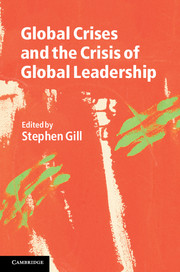Book contents
- Frontmatter
- Contents
- Contributors
- Acronyms
- Acknowledgements
- Introduction: global crises and the crisis of global leadership
- Part I Concepts of Global Leadership and Dominant Strategies
- Part II Changing Material Conditions of Existence and Global Leadership: Energy, Climate Change and Water
- Part III Global Leadership Ethics, Crises and Subaltern Forces
- Part IV Prospects for Alternative Forms of Global Leadership
- Glossary
- Bibliography
- Index
Introduction: global crises and the crisis of global leadership
Published online by Cambridge University Press: 05 June 2012
- Frontmatter
- Contents
- Contributors
- Acronyms
- Acknowledgements
- Introduction: global crises and the crisis of global leadership
- Part I Concepts of Global Leadership and Dominant Strategies
- Part II Changing Material Conditions of Existence and Global Leadership: Energy, Climate Change and Water
- Part III Global Leadership Ethics, Crises and Subaltern Forces
- Part IV Prospects for Alternative Forms of Global Leadership
- Glossary
- Bibliography
- Index
Summary
The subject of this book is global crises and the crisis of global leadership. Its title refers to crises, in the plural, because – despite the incessant and important focus on the financial and economic crisis that has preoccupied much of the world over the past three years – in the current global conjuncture the world faces a diversity of intersecting, but nonetheless ontologically distinct, crises. These are located not only within political economy but also in ethics, law, society, culture and ecology – and they all call into question the prevailing models of global development and governance. Nevertheless, although these intersecting crises are distinct, most of the authors in this collection connect them with some of the contradictions associated with the current neoliberal phase of global capitalism. Taken together, these crises may be said to combine in what I call a global organic crisis.
The term ‘global leadership’ is initially used in this volume in the singular, since there is an identifiable, neoliberal nexus of ideas, institutions and interests that dominates global political and civil society – one that is associated with the most powerful states and corporations. This nexus involves a form of leadership and expertise intended to sustain and enlarge capitalist market society and its associated principles of governance; in particular, it claims to provide effective mechanisms of stabilization and the ability to master crises – a claim of competence that is challenged in this book. Moreover, although neoliberal crisis management is preoccupied with economic stabilization, it has generally made minimal effort to address the fundamental crises of livelihood and social reproduction (the way in which production is connected to the wider social conditions within which it operates) that afflict a majority of the world's population, such as the global health, food, energy and ecological crises. Moreover, in responding to crises, neoliberal political leaders have frequently sought to make ‘unholy’ alliances with authoritarian and dictatorial forces, particularly in much of the Third World; in both North and South they have also sought to maintain a condition of depoliticization and political apathy. The goal has been to channel and incorporate forms of resistance and contain fundamental political contestation as to the nature and purposes of rule. Whether this strategy can continue is an open question.
- Type
- Chapter
- Information
- Global Crises and the Crisis of Global Leadership , pp. 1 - 20Publisher: Cambridge University PressPrint publication year: 2011
- 1
- Cited by



